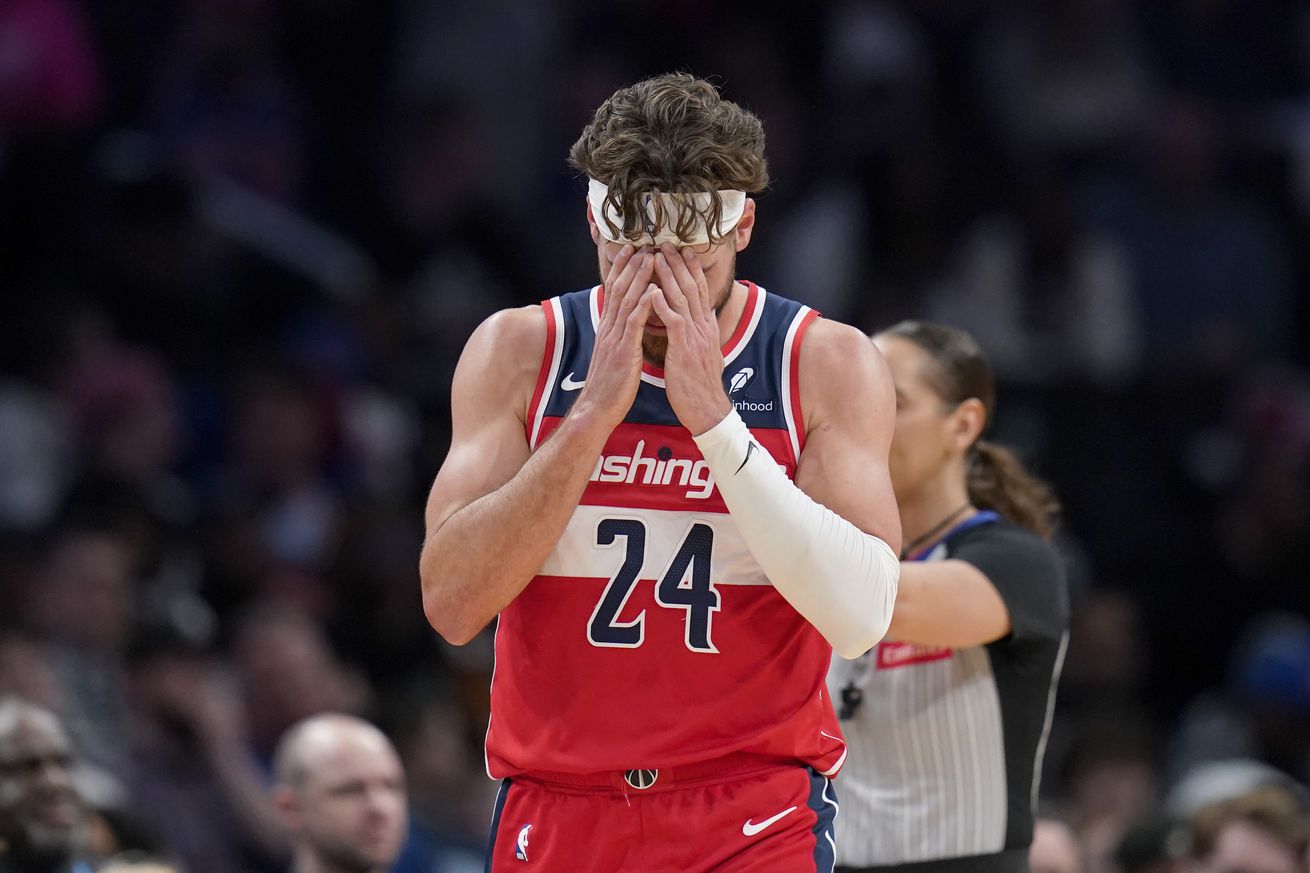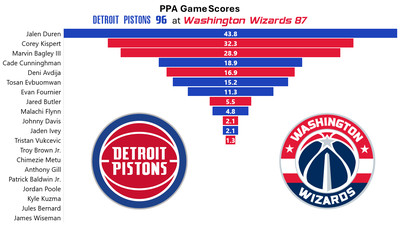
Stats, analysis, commentary.
It was sometime in the second half when it hit me: I’ve seen this before. Not in a basketball game but in a chess video one of my sons sent me a couple years ago.
The video was of an online match between eight-year-olds just getting started. Every time one of them made a move, their opponent’s odds of winning improved. This was the essence of last night’s Washington Wizards vs. Detroit Pistons matchup. Both teams worked hard to get difficult shots — despite neither team actually defending well. Both teams played in a way that seemed designed to maximize the other team’s chances of getting the victory.
As my other son said during the fourth quarter, “This is an amazing display of inept basketball.”
A few minutes later he said, “This is the worst basketball I’ve seen all year, and I’ve been watching college ball.”
Despite Kyle Kuzma and Jordan Poole combining to go 8-37 from the floor, the Wizards outshot the Pistons 46.0% to 44.9% (effective field goal percentage). The team that shoots best in the NBA wins about 80% of the time, but for a second straight game, Washington shot better and lost.
Worth noting: while the Wizards “outshot” the Pistons, they had an abysmal shooting game. This was not a case of Detroit defending at a high level. Washington’s shooters ran free much of the night. They just missed.
That said, shooting wasn’t the biggest issue. The problem areas were turnovers and free throws. The Wizards were -5 in turnovers, and -10 from the free throw line. A major reason for that: Washington kept firing from three-point range (finishing 9-33 from deep) while the Pistons attacked the paint (just 6-24 from three).
The Recitation of Woes
Washington was missing a few guys due to injury. Tyus Jones (back), who’s been their best player all season, was out for eighth straight game. Also absent from the lineup: Bilal Coulibaly (wrist), Eugene Omoruyi (ankle), Richaun Holmes (toe), and Landry Shamet (calf).
Detroit also had several absences, including: Ausar Thompson (blood clot), Isaiah Stewart (hamstring), Simone Fontecchio (toe), Quentin Grimes (knee), Taj Gibson (hamstring), and Marcus Sasser (illness).
It’s a Gordian knot trying to figure out which team was more affected by injuries. One signal that might have some weight: the Pistons started (and gave 33 minutes to) someone named Tosan Evbuomwan, a British player whose father played college basketball in Nigeria. Evbuomwan apparently played his college ball at Princeton. (He wasn’t bad against the Wizards.)
Musings & Observations
- If you need a palette cleanser after last night’s game and want to hear talent and skill, check out this live version of Poinciana from Keith Jarrett, Gary Peacock, and Jack DeJohnette. This is a tune Ahmad Jamal made famous, and the Keith Jarrett Trio’s rendition is great. I listened to this track while writing about this game.
- Corey Kispert made shots and got some “hey look, the ball bounced right to me” rebounds.
- Marvin Bagley III notched 15 points and 11 rebounds in 27 minutes.
- How did Deni Avdija’s 18 points, 11 rebounds, and 9 assists end up rating only slightly above average in my PPA metric (see below)? Five turnovers (that’s a lot), and 6-14 shooting. His offensive rating (points produced per possession x 100) was 103 on 26.1% usage. That’s poor for the NBA this season (league average is 115.5) but good for this game. Washington’s offensive rating was 87. Detroit’s was 96.
- The biggest culprits in Washington’s atrocious offensive performance were Kuzma and Poole. They seemed determined to shoot Washington out of it, and the only thing that might have stopped them from accomplishing that feat was their penchant for turning it over first. Kuzma shot 5-22 from the floor (0-6 from three) and committed five turnovers. Poole shot 3-15 (1-8 from deep) and had five turnovers.
- Poole and Kuzma combined to use 44 possessions to produce 21 points. That’s an offensive rating of 47. Their teammates used 46 possessions to produce 66 points. That’s an offensive rating of 118. In my +pts stat (which compares individual efficiency to league average using the same number of possessions), the duo combined for a -30.1. That is to say that they produced 30 fewer points than average with their possessions used last night.
- The craptacular performances of Poole and Kuzma have me musing about how we define things like “talent” and “skill.” This is probably something I’ll come back to in the offseason when I’ve had a chance to do more thinking.
- I renew the observation that the Wizards work insanely hard to get difficult shots. This is not an issue of design or coaching but of talent. Avdija, for example, would slot well on a good team as a second side scorer and playmaker. For that to work, he would need a first side scorer and playmaker, and the Wizards don’t have one. They let Kuzma and Poole masquerade as lead offensive players, but neither belongs in that role. That offensive leader — someone who can drive a high-level (or even above average) offense — is not on the roster.
- The most puzzling numbers of the night were these — Anthony Gill, 18 minutes; Tristan Vukcevic, 2 minutes. I like and respect Gill. His basketball journey, and who he is as a person, is admirable. What I’m saying isn’t an attack on Gill but a question about the priorities of the team’s decision-makers. Gill’s an upbeat leader and locker room presence. As a player, he’s an always prepared, try-hard, break glass in case of emergency guy. Which is all fine. But he’s 31 years old, and…well…he’s not getting any better. As David Berri wrote, basketball players age like milk. Those minutes should go to younger players who might have an NBA future. Like Vukcevic or Patrick Baldwin Jr. (7 minutes) or even Johnny Davis (10 minutes) or Jules Bernard (5 minutes).
Four Factors
Below are the four factors that decide wins and losses in basketball — shooting (efg), rebounding (offensive rebounds), ball handling (turnovers), fouling (free throws made).
Stats & Metrics
Below are a few performance metrics, including the Player Production Average (PPA) Game Score. PPA is my overall production metric, which credits players for things they do that help a team win (scoring, rebounding, playmaking, defending) and dings them for things that hurt (missed shots, turnovers, bad defense, fouls).
Game Score (GmSC) converts individual production into points on the scoreboard. The scale is the same as points and reflects each player’s total contributions for the game. The lowest possible GmSC is zero.
PPA is a per possession metric designed for larger data sets. In small sample sizes, the numbers can get weird. In PPA, 100 is average, higher is better and replacement level is 45. For a single game, replacement level isn’t much use, and I reiterate the caution about small samples sometimes producing weird results.
POSS is the number of possessions each player was on the floor in this game.
ORTG = offensive rating, which is points produced per individual possessions x 100. League average last season was 114.8. Points produced is not the same as points scored. It includes the value of assists and offensive rebounds, as well as sharing credit when receiving an assist.
USG = offensive usage rate. Average is 20%.
ORTG and USG are versions of stats created by former Wizards assistant coach Dean Oliver and modified by me. ORTG is an efficiency measure that accounts for the value of shooting, offensive rebounds, assists and turnovers. USG includes shooting from the floor and free throw line, offensive rebounds, assists and turnovers.
+PTS = “Plus Points” is a measure of the points gained or lost by each player based on their efficiency in this game compared to league average efficiency on the same number of possessions. A player with an offensive rating (points produced per possession x 100) of 100 who uses 20 possessions would produce 20 points. If the league average efficiency is 114, the league — on average — would produced 22.8 points in the same 20 possessions. So, the player in this hypothetical would have a +PTS score of -2.8.

